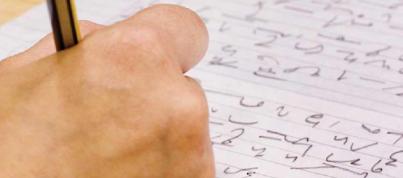Shorthand is still the future: Why journalism’s old skills are still as relevant as all the new ones

The armoury of tools used by reporters to create journalism is changing as never before, writes Graham Dudman.
Periscope, Instagram, Twitter … the list goes on.
These new and not so new devices are increasingly essential for newsgathering in 2015. No argument.
The pace of change in reporting is now so rapid that you might think we’re in the middle of a storytelling revolution.
And you’d be right. (This time last year, how many people had heard of Periscope?).
But among the all-singing, all-dancing hi-tech digital tricks and toys there is one old-fashioned tool still standing head and shoulders above the rest.
It has been top dog for decades and should remain so for decades to come.
Let’s give the biggest hand possible to the S-word: shorthand.
In my book, a reporter isn’t the finished article until they’ve passed their NCTJ shorthand at 100 words a minute.
Why? Because the ability to write down what somebody says at the same time they’re saying it then read your note back instantly is essential to do the job properly.
Shorthand is a brilliant skill no digital trickery can match.
But learning shorthand is bloody hard work which takes weeks and months of tedious practice to master.
In truth, you CAN work as a reporter without 100wpm.
But the chances are you’ll be a second-rate operator who secretly wishes they could write shorthand.
If shorthand lessons for you at the moment are a series of seemingly impossible tasks getting your head round squiggles, dots and lines – it will get easier, I promise.
When I began my NCTJ course at Preston Poly way back in 1983, I looked at the timetable and saw so many shorthand classes I thought I’d been put on a secretarial course by mistake.
I’d imagined learning journalism would mean being out on the streets interviewing interesting people, writing stories, drawing headlines and designing pages. All exciting stuff.
Instead all I got was shorthand, shorthand and more shorthand. What a pain in the arse.
But after a few weeks the daily drills started to make sense.
Evening upon evening practising with tapes, building up speed and mastering short-forms meant Teeline eventually became second nature.
Shorthand taught on my NCTJ course was a skill I used every day as a reporter on every paper I ever worked for.
I would never have made it to Fleet Street without shorthand.
When I saw the best reporters in action, the speed and accuracy of their shorthand was stunning. And great shorthand was not restricted to newspaper hacks.
You could always spot the best TV reporters on the road because they had shorthand. This meant they could come out of court or a press conference and deliver a piece straight to camera referring to their notes instead of taking an age listening back to a tape.
There are many in the industry who think shorthand has passed its sell-by date.
The well-rehearsed arguments of shorthand deniers go like this: ‘I never got it, and it didn’t hurt my career.’

Shorthand is still a vital skill for today’s journalists, argues Graham Dudman
Then there’s: ‘You can Tweet from court now, who needs shorthand?’
Or the obvious: ‘Lawyers always ask for a tape of the interview if there’s a complaint.’
Not to mention: ‘Can’t beat the quality of iPhone recordings.’
To which the responses go: if you’ve managed to get on without shorthand, you’ve been incredibly lucky and as a trainee reporter I wouldn’t want to trust my career to luck; reporting detailed courtroom evidence needs an accurate note otherwise it’s unsafe and legally fraught with danger; tapes are great for sorting complaints but a full contemporaneous shorthand note will be accepted as evidence by a court. Smartphones are wonderful devices but listening to and transcribing an interview takes way longer than reading a shorthand note which could mean failure in a race to a deadline.
Sadly, some of the worst shorthand deniers are found in colleges and universities teaching journalism.
Perhaps it’s not surprising. Shorthand is difficult to teach and poor results are embarrassing especially if you’re charging top dollar for a place on a course.
In my old life at The Sun, I used to come across countless students finishing degrees in journalism who didn’t realise they’d been terribly let down by their chosen course.
The conversation would go something like this:
Student: ‘I’ve got a 2.1 in journalism from the university of wherever and I’d love to come and work at The Sun.’
Me: ‘Have you got shorthand?’
Student: ‘No.’
Me: ‘How come?’
Student: ‘Well, they taught it for the first term then stopped the lessons.’
Me: ‘Why did they do that?’
Student: ‘The lecturers said they didn’t think it was important anymore.’
Me: ‘How fast did you get?’
Student: ‘Errr, not sure really. Didn’t take any exams in it.’
Me: ‘When you signed up for the course what kind of job did you think it would lead to?’
Student: ‘A reporter on a newspaper.’
Me: ‘You’ve been conned.’
At The Sun, we had a simple rule when selecting applicants for the graduate trainee scheme. Anyone who hadn’t passed shorthand at 100wpm was automatically rejected at the first hurdle. No shorthand = application in bin.
Passing shorthand not only tells a prospective employer you’re safe to cover court cases but shows you have the determination and perseverance to pass a very difficult exam.
One of the reasons I was delighted to join News Associates was their passion for shorthand.
Over the last academic year, 97% of their full-time trainees in London and Manchester achieved the 100 wpm qualification – the national average on 2013/2014 figures is 37 percent.
Take a bow fantastic News Associates shorthand teachers Angela Catto and Kim Reader.
Any journalism course which doesn’t take shorthand seriously doesn’t deserve to be taken seriously.
It might be unfashionable and it’s certainly old school but in 2015 more than ever it is essential for a properly trained journalist to have 100wpm.
And finally….
It wasn’t long ago you couldn’t miss stories of an impending invasion of Britain from migrants at camps in Calais.
The Jungle residents risking life and limb, transport chaos, panicking politicians, even BBC-bashing with Songs of Praise getting it in the neck.
Chaos in Calais was a huge story dominating front pages and news bulletins for large parts of the summer.
Not any more.
The migrant story has moved to Hungary, Slovakia and Munich.
Calais is now long forgotten proving once again that news is very much here today, gone tomorrow.
Graham Dudman is a former Managing Editor of The Sun and Editorial Development Director at News UK, working across The Times, Sunday Times and The Sun. He is an editorial consultant at News Associates. Follow Graham on Twitter @1dudders


